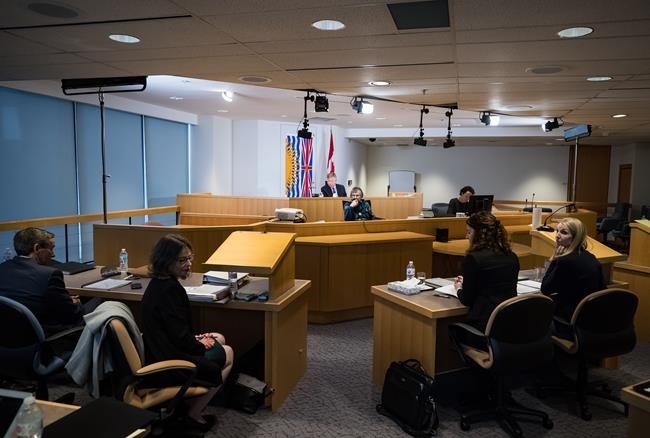
Two groups representing lawyers said in closing submissions Tuesday at a public inquiry into money laundering their profession should be excluded from any government regulations aimed at fighting money laundering in British Columbia in order to protect the confidentiality of the lawyer-client relationship. The Cullen Commission of Inquiry into Money Laundering in British Columbia is shown in this February 24, 2020, file photo. THE CANADIAN PRESS/Darryl Dyck
Republished October 19, 2021 - 4:08 PM
Original Publication Date October 19, 2021 - 1:51 PM
VANCOUVER - Two groups representing lawyers say their profession should be excluded from any government regulations aimed at fighting money laundering in British Columbia in order to protect the confidentiality of the lawyer-client relationship.
Kevin Westell made joint closing submissions at a public inquiry into money laundering on behalf of the B.C. chapter of the Canadian Bar Association and the Criminal Defence Advocacy Society.
The bar association representing 7,000 lawyers in the province is also concerned about suggestions that there is a high risk of money laundering inherent in the work of lawyers, Westell told the inquiry as it wrapped up on Tuesday.
The province announced the launch of the hearings in 2019 after three reports outlined a money laundering crisis fuelled by billions of dollars being funnelled through the gambling, real estate, horse racing and luxury car sectors as well as the illegal drug trade.
The inquiry heard from 198 witnesses since hearings began in May 2020.
Westell told inquiry commissioner Austin Cullen that his ultimate recommendations could significantly affect how lawyers do their jobs and the extent to which members of the public will continue to feel confident that their dealings with lawyers would remain strictly confidential.
The Canadian Bar Association maintains that the proper approach to dealing with concerns about money laundering in the legal profession must be through ongoing self-regulation to ensure that lawyers aren't forced into a situation where they're spying on their clients, he said.
The groups' concerns about potential infringement of confidentiality as part of solicitor-client privilege as well as the independence of lawyers stem from findings in one of two government-commissioned reports on "dirty money" authored by Peter German, a lawyer and former RCMP deputy commissioner.
German said in the second report that lawyers in B.C. are at high risk of being targeted by money launderers, not only because they are exempt from financial reporting, unlike notaries, but due to the risks that are part of dealing with real estate transactions.
"Lawyers are the ‘black hole’ of real estate and of money movement generally. With no visibility by law enforcement on what enters and leaves a lawyer’s trust account, many investigations are stymied," German wrote in the March 2019 report.
He also said the "no cash rule" governing the acceptance by lawyers of no more than $7,500 is limited in its effect because it does not prevent someone from giving tens or hundreds of thousands of dollars in cash to a lawyer for bail money, or for fees and expenses.
However, Westell said German offered no suggestions on how third-party reporting of cash and suspicious transactions should be handled.
"An external reporting requirement for lawyers would inevitably breach solicitor-client confidentiality. Cash and suspicious transaction reporting would require documentation and disclosure of the source of funds to a party outside (the Law Society of B.C.)," he said.
Criminal defence lawyers are particularly concerned that the government and police may take increasingly invasive anti-money laundering measures that could be unproven in their effectiveness and "unfairly trample on the rights of British Columbians," Westell said.
However, lawyer Toby Rauch-Davis, who represents a coalition that includes the group Transparency International Canada, told Cullen that lawyers, bankers and accountants should be included in any policies in order to allow for public scrutiny of how the advice of those professionals could be sought by criminal enterprises involved in money laundering.
"A finding that accountants and other professionals pose no money-laundering risk is akin to the kind of wilful blindness that led us to these proceedings," he said.
"Given the fact that there can be no public scrutiny of the solicitor-client relationship, there's an enhanced public interest in having complete transparency on the measures that the law society takes to ensure lawyers are not facilitating money laundering."
The commission's terms of reference say Cullen's final report is due Dec. 15.
This report by The Canadian Press was first published Oct. 19, 2021.
News from © The Canadian Press, 2021